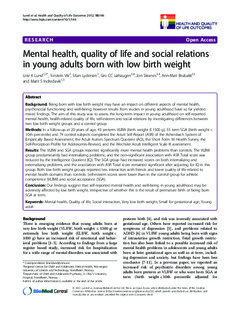Mental health, quality of life and social relations in young adults born with low birth weight
Lund, Line Knutsen; Vik, Torstein; Lydersen, Stian; Løhaugen, Gro; Skranes, Jon; Brubakk, Ann-Mari; Indredavik, Marit Sæbø
Journal article, Peer reviewed
Permanent lenke
http://hdl.handle.net/11250/2356310Utgivelsesdato
2012Metadata
Vis full innførselSammendrag
Background: Being born with low birth weight may have an impact on different aspects of mental health,
psychosocial functioning and well-being; however results from studies in young adulthood have so far yielded
mixed findings. The aim of this study was to assess the long-term impact in young adulthood on self-reported
mental health, health-related quality of life, self-esteem and social relations by investigating differences between
two low birth weight groups and a control group.
Methods: In a follow-up at 20 years of age, 43 preterm VLBW (birth weight ≤ 1500 g), 55 term SGA (birth weight <
10th percentile) and 74 control subjects completed the Adult Self-Report (ASR) of the Achenbach System of
Empirically Based Assessment, the Adult Autism Spectrum Quotient (AQ), the Short Form 36 Health Survey, the
Self-Perception Profile for Adolescents-Revised, and the Wechsler Adult Intelligent Scale III assessment.
Results: The VLBW and SGA groups reported significantly more mental health problems than controls. The VLBW
group predominantly had internalizing problems, and the non-significant association with ASR Total score was
reduced by the Intelligence Quotient (IQ). The SGA group had increased scores on both internalizing and
externalizing problems, and the association with ASR Total score remained significant after adjusting for IQ in this
group. Both low birth weight groups reported less interaction with friends and lower quality of life related to
mental health domains than controls. Self-esteem scores were lower than in the control group for athletic
competence (VLBW) and social acceptance (SGA).
Conclusion: Our findings suggest that self-reported mental health and well-being in young adulthood may be
adversely affected by low birth weight, irrespective of whether this is the result of premature birth or being born
SGA at term.
